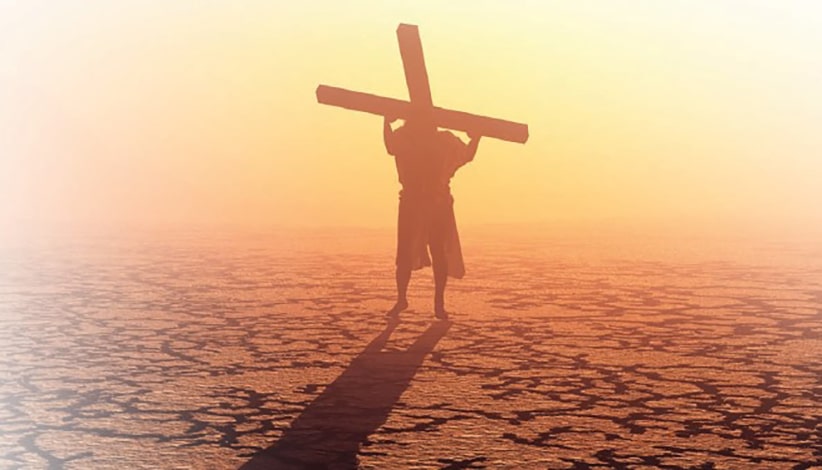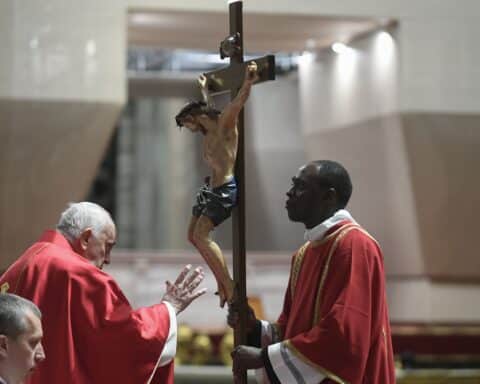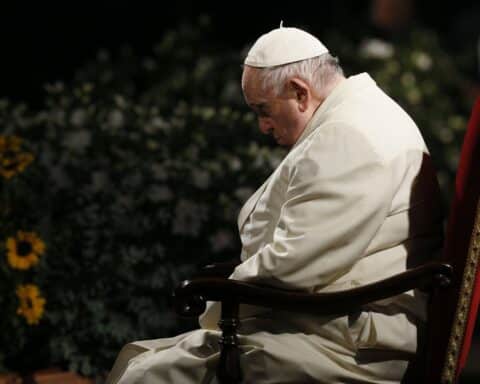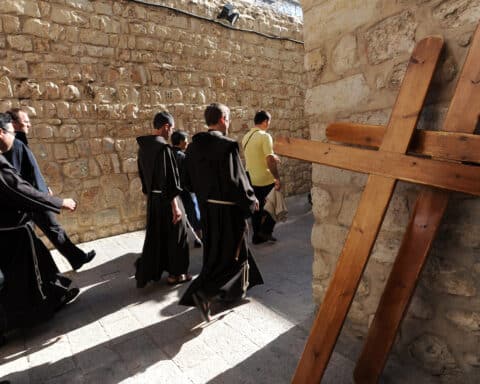The season of Lent is special for Catholics. It is a time of preparation for the great feast of Easter, the annual celebration of Christ’s resurrection. Historically, the season can trace its roots and penitential nature to the period of preparation of those preparing for baptism and initiation in the Church at Easter. Today, Lent remains an important phase of final, intensive preparation for adults who will receive the sacraments of initiation at the Easter Vigil, but it is mostly marked by our interior conversion through the penitential triad of prayer, fasting and almsgiving and our recommitment to the baptismal promises at Easter.
In the wilderness
Lent lasts for 40 days. Forty is a number filled with meaning in the Bible, often representing a period of preparation or trial. Think of the Genesis account of Noah and the flood, a foreshadowing of baptism itself. Then there is the Exodus account of the 40 years the Israelites spent in the desert or the 40 days and nights Moses twice spent atop Mount Sinai receiving the Law (see Ex 24:18 and 34:28).
Building upon the significance of 40 in the Old Testament, we encounter the number again in the New. A significant episode of 40 in the Gospels is the 40 days Christ spent in the wilderness, previous to the inauguration of his public ministry (see Mt 4:1-11, Mk 1:12-13, or Lk 4:1-13). In many ways, the season of Lent takes on the tone of this episode from the life of Christ.
The ruggedness and silence of the desert are parallels drawn to our own spiritual lives. Lent is an opportunity to take stock of the status of our souls and focus on ways to smooth the roughness of our faults and sins and reflect on the opportunities to enter more deeply into our relationship with God.
Prayer is what nurtures and strengthens our bond with God, and Lent is an invitation to make progress in this aspect of our spiritual lives. And to hear the Lord, we must be sure to imitate the desert by making times of silence to hear the Lord speak.
At Easter, Catholics renew their baptismal promises, and Lent is a time to prepare for doing so with purity of intention. Do we truly chose God over the allurement that Satan presents to us? Do we commit ourselves anew to growing in our love of God? Do we take the time to focus on and meditate upon all our faith entails? We need to make sure we are doing this in our lives and Lent is an annual opportunity to focus on what matters most.
In order to say “no” to Satan in his multitudinous temptations, we must learn and recommit ourselves to say “yes” to God. Christ in the desert offers us a model for doing this. Both Matthew and Luke record Christ’s responses to the devil’s temptations as quoting the word of God in Scripture. The Bible is shown here to be more than some isolated text recited by the religiously inclined, but is, rather, what defines who we are and what we hope to be. By Christ’s own description, his word is “spirit and life” (Jn 6:63).
As Christians, we know our identity is built upon the reality that we are adopted children of the Father, the gift bestowed upon us in baptism. No longer are we defined by what separates us from God thanks to the new life we receive in Christ. With St. Paul, Christians are called to recognize “Christ lives in me” (Gal 2: 20). It is a daily task for Christians to echo St. John the Baptist by putting into practice his maxim that Christ must increase while we must decrease (see Jn 3: 30). This is where fasting comes in.
The practice of fasting exists in order to help us grow in our awareness that in God alone do we find the fulfillment of all our desires. Penances are to be willingly taken on out of love so as to create opportunities of emptiness in our lives. In these situations we find our nourishment in God, and so use these penances as a way to say “no” to what we want and the temptations placed before us and say “yes” to the life God desires of us. Penances also present the chance to willingly take on suffering, in imitation of Christ’s own saving death, which he took on willingly out of love for all mankind. In so doing, we put ourselves in solidarity with all those who suffer and do without even the basics of life on a daily basis.
Almsgiving is closely related to the intent of fasting, the last point made above expresses its relevance. The idea of offering monetary assistance to the poor and vulnerable is that we are saying “no” to other uses for that money which would benefit ourselves. And out of love we are putting that money to good use as a means to provide the basics of life to those who would otherwise do without. Out of our heart’s abundance, in imitation of Christ, we should desire to give until there is nothing left to give. Even as he hung dead on the Cross, the blood and water that gushed from Christ’s pierced side shows how he still gave even when he had already given his all (see Jn 19:34).
Fasting and abstinence
The fourth precept of the Church proposes observation of the Church’s days of fasting and abstinence to “help us acquire mastery over our instincts and freedom of heart” (Catechism of the Catholic Church, No. 2043). Catholics age 14 and over are obligated to refrain from meat on the Fridays of Lent — a practice referred to as abstinence. During the rest of the year, however, Catholics are asked to perform this practice as well, while in the United States, another penance may be substituted in its place. Traditionally, Eastern Catholics have practiced a more strict form of fasting and abstinence during “Great Lent,” fasting Monday through Friday and abstaining from all animal products like dairy and eggs in addition to oil and wine.
For Catholics aged 18 to 59, fasting is obligated on Ash Wednesday and Good Friday. There are exceptions on account of health, which can and should be discussed with a pastor. The paschal fast is referred to as extending Good Friday’s fasting into Holy Saturday — the day commemorating Christ’s descent among the dead as his body awaited the resurrection.
While the Church’s Canon Law might deal with the specifics of who is affected by the law of fasting (i.e. age, health, etc.), it does not specify how to fast. Those who participate in fasting limit their intake of food, at a minimum, to one full meal and two partial meals (sometimes referred to as collations). Often, many choose to fast beyond this traditional norm of self-discipline. Interestingly, fasting is related to the intake of food, not drink, unless the liquid has food value (like a nutrition shake, etc.). But no one will stop you from restricting yourself to water only on fasting days.
Fasting is not obligated on solemnities, the highest degree of celebration in the Church’s calendar. From time to time universally celebrated solemnities may fall on a Friday of Lent, such as those of St. Joseph (March 19) or the Annunciation (March 25) and therefore the obligation of fasting is relieved. There are also times when local solemnities are also affected in the same way, for instance in places when the feast of a diocese or parish’s principal patron falls on a Friday of Lent (since those are celebrated as a solemnity in those places).
Scrutinies
While Lent marks an important time for the elect preparing to celebrate the sacraments of initiation at Easter, the final three Sundays of Lent present a period of intense prayer and preparation for them. On the third, fourth and fifth Sundays of Lent, the Rite of Christian Initiation of Adults instructs that there be celebrated various rites pertaining to this period of “purification and enlightenment” for the elect — these rites are called the “scrutinies.” For pastoral reasons, however, they may be celebrated at another time.
The scrutinies are intended to promote a longing for the redemption and salvation that is available to us only in Jesus Christ. The Gospels for the pertinent Sundays are used in relation to these rites from Year A in the Lectionary. These Gospel readings are meant to stir up in the elect a desire to unite themselves more fully with “Christ the Redeemer, who is the living water (Gospel of the Samaritan woman in the first scrutiny), the light of the world (Gospel of the man born blind in the second scrutiny), the Resurrection and the life (Gospel of Lazarus in the third scrutiny)” (No. 143).
Since the elect are preparing for baptism, there are three rites of exorcism that take place during the scrutinies. These seek to free the elect “from the effects of sin and from the influence of the devil” (No. 144). “The scrutinies are meant to uncover, then heal all that is weak, defective or sinful in the hearts of the elect; to bring out, then strengthen all that is upright, strong and good” (No. 141).
Related to the first and third scrutinies, the elect are presented with the Creed, which they are expected to commit to memory and recite aloud publicly prior to their baptism, and the Lord’s Prayer.
These rites are more than likely, although not required to be, celebrated at a parish liturgy on the previously mentioned Sundays of Lent. Whether present or not at these liturgies, all are called to unite ourselves with the elect in a spirit of prayer as they prepare to be incorporated into the Body of Christ at the Easter Vigil.
Laetare Sunday
The entrance antiphon for the fourth Sunday of Lent reflects on Isaiah 66:10-11: “Rejoice, Jerusalem, and all who love her. Be joyful, all who were in mourning; exalt and be satisfied at her consoling breast.” The first word in the Latin text of the antiphon, “Laetare,” means “rejoice” and gives this Sunday its name.
On Laetare Sunday, amid the Lenten practices of fasting and penance, the Church draws our attention to the hope and joy of the resurrection that will be celebrated at Easter. The priest may put on rose-colored vestments this day — as is often the case, although optional — as a vivid visual reminder of this day’s joyous meaning.
While flowers may not adorn the altar during Lent, the General Instruction of the Roman Missal provides the opportunity to put a brief stay on this practice on the Fourth Sunday of Lent.
Laetare Sunday gives us all the chance to renew our belief in and prepare to celebrate the Resurrection, the central reality of Christian Faith. Think of ways you can make your joy in this reality known. Jesus Christ is risen from the dead — a reality that should always fill our hearts with joy, even in the midst of our Lenten observance.

During Lent, there is, perhaps, no devotion more popular than the Stations of the Cross. This devotion finds its roots with the Franciscans who helped rebuild the sites of the Holy Land following destruction during the medieval crusades. Originally appealing to pilgrims in Jerusalem who journeyed along Christ’s way to Calvary, the enduring relevance of the Stations of the Cross in the Christian life caused the devotion to spread. Today, it’s a rare parish church or complex that does not contain the Stations of the Cross. As we meditate on Christ’s passion and death, we are given the opportunity to join our sufferings to Christ. Christ’s passion is the model of what true love is all about. The Stations of the Cross provide the opportunity to meditate on the self-sacrificial foundation of love that Christ reveals to us.
A spiritual plan
Each of us should take advantage of the spiritual opportunities presented by the season of Lent. There is ample opportunity for spiritual growth, if only we commit to making it happen.
In order to be effective in Lenten observances, it might be advantageous to have a plan. There are many suggestions put forth for consideration, or you may make up your own. One plan to make your Lent more spiritually engaging and profitable might be our L-E-N-T Plan.
Lectionary — We must be grounded in the Word of God.
You cannot expect to grow in your relationship with God without letting him speak to you. If you do not make it a habit to prepare for Sunday Mass by looking at the readings ahead of time, Lent is a great time to start. The readings from Mass are collected in a book called the Lectionary.
Take a few minutes each day to take a look at the readings for the Sunday ahead and meditate on them in prayer. What is the Lord telling you? What can we learn from the Lord to be the people he made us to be? Or, perhaps you can find different ways to enhance such an experience if you pray with the Sunday readings already.
Extra time in prayer — Build your relationship with God.
You cannot grow in your relationship with God unless you make the time to speak with him and give him praise. Each of us can find more time to spend with the Lord in conversation and adoration. Consider what you can add to your daily or weekly prayer life during Lent. Perhaps attend Mass an additional day or even each weekday of Lent. Perhaps make it a point to attend devotional or formational opportunities in your parish like a Bible study or the Stations of the Cross. Or commit to individual prayer time at home, on the way to or from work or in the presence of the Blessed Sacrament.
Say “No” to yourself — Focus on God and others.
The central theme put before us in Lent draws us toward a focus on Christ’s passion and death. Through that prism we find the foundation for our Lenten observances. Through them we seek to love God and others above ourselves — to follow Christ’s model of self-sacrificial love that stirs our hearts to abandon ourselves in imitation of his illumination of love’s greatest action. Lent is a great opportunity for us to say “no” to a variety of things. That’s the fundamental point of prayer, fasting and almsgiving. We say “no” to ourselves and “yes” to love of God and others. Lent is a good time to identify opportunities for us to increase our service to our neighbor by offering more of our time, talent and treasure to their benefit.
Turn away from sin — Recommit to the Gospel.
“Repent, and believe in the Gospel” is one of the two formulas the Church provides for the minister to recite when distributing ashes on Ash Wednesday. Taking this as something of a motto for Lent can lead us into a deeper awareness of our sinfulness and its consequences and our desire to recommit to the Gospel each day. We need to make time to examine our consciences and reflect on our thoughts, words and deeds. When we sin we should not just be upset with the consequences, although that is an important aspect of the heart that desires conversion and repentance. We should also be filled with a sense of sorrow because our sins themselves reject the love that God freely gives us. Lent can be an opportunity for us to acknowledge our sins before God and receive his reconciliation — which always will make us more aware of how our sin affects our relations with God and neighbor and fill us with a resolve to avoid it again because we experience again God’s love we rejected by our sin.
Michael R. Heinlein is editor of OSV’s The Catholic Answer. Follow him on Twitter @HeinleinMichael.





